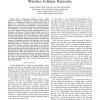Free Online Productivity Tools
i2Speak
i2Symbol
i2OCR
iTex2Img
iWeb2Print
iWeb2Shot
i2Type
iPdf2Split
iPdf2Merge
i2Bopomofo
i2Arabic
i2Style
i2Image
i2PDF
iLatex2Rtf
Sci2ools
86
Voted
INFOCOM
2008
IEEE
2008
IEEE
Spot Pricing of Secondary Spectrum Usage in Wireless Cellular Networks
—Recent deregulation initiatives enable cellular providers to sell excess spectrum for secondary usage. In this paper, we investigate the problem of optimal spot pricing of spectrum by a provider in the presence of both non-elastic primary users, with long-term commitments, and opportunistic, elastic secondary users. We first show that optimal pricing can be formulated as an infinite horizon average reward problem and solved using stochastic dynamic programming. Next, we investigate the design of efficient single pricing policies. We provide numerical and analytical evidences that static pricing policies do not perform well in such settings (in sharp contrast to settings where all the users are elastic). On the other hand, we prove that deterministic threshold pricing achieves optimal profit amongst all single-price policies and performs close to global optimal pricing. We characterize the profit regions of static and threshold pricing, as a function of the arrival rate of prima...
| Added | 31 May 2010 |
| Updated | 31 May 2010 |
| Type | Conference |
| Year | 2008 |
| Where | INFOCOM |
| Authors | Huseyin Mutlu, Murat Alanyali, David Starobinski |
Comments (0)

